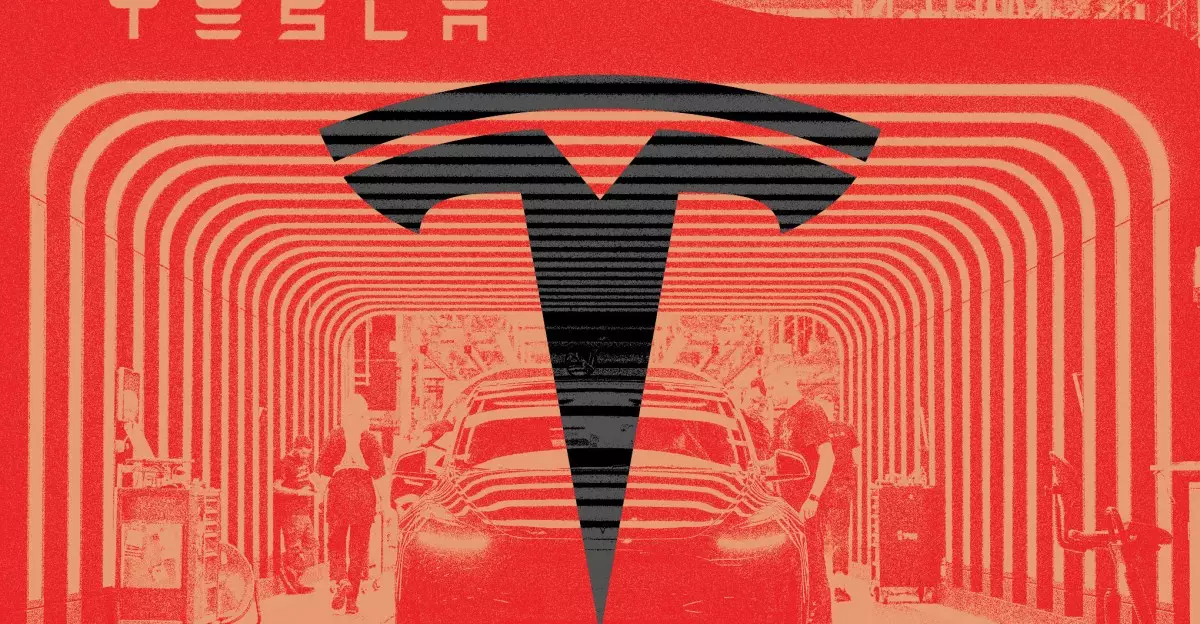Tesla Inc., once a shining beacon of innovation and success in the electric vehicle (EV) market, is currently grappling with a significant decline in sales across Europe. Reports indicate that the company’s sales have plummeted nearly 50% in a single month, specifically marking a staggering 49% drop in April from the previous year. This descent is not simply a blip on the radar but a glaring indicator of deteriorating consumer confidence in the brand—a stark warning signal for a company that has long prided itself on its pioneering role in sustainable transport.
Traditionally, monthly sales figures for individual manufacturers often fly under the radar of broader automotive discussions. However, Tesla’s dire circumstances demand attention, especially as they unfold within a market that is otherwise burgeoning with electric vehicle sales. The European Automobile Manufacturers Association recently revealed that battery-electric vehicle registrations during the same period saw an impressive growth of 26.4%. This juxtaposition raises critical questions about Tesla’s position within a thriving segment, showcasing not just an alarming decline, but also an apparent disconnect between the brand and the rapidly evolving consumer landscape.
A Misguided Strategy Amidst Competition
With the recent launch of the refreshed Model Y—the vehicle poised to reinvigorate Tesla’s market appeal—expectations were high. Yet, it seems the anticipated wave of new customers has failed to materialize. Instead of capturing market share, Tesla appears to be falling victim to an increasingly competitive landscape. The emergence of both domestic rivals and resilient Chinese manufacturers has intensified competition in a market that Tesla once dominated. This scenario presents an urgent need for a strategic reassessment within the company. Instead of merely updating vehicles, a deeper understanding of market dynamics and consumer preferences appears necessary.
Elon Musk’s influence on the brand has not helped, as political entanglements and controversial decisions have tarnished Tesla’s reputation. His public support for extremist political factions in Europe has drawn ire from a significant segment of the consumer base, disproportionately alienating customers rather than fostering loyalty. In a time when EV adoption is flourishing, Musk’s political maneuvering threatens to overshadow the brand’s technological achievements, leading to a critical brand identity crisis that goes beyond mere sales figures.
The Ripple Effect of Brand Perception
Recent surveys provide insightful context into Tesla’s diminishing brand status. Once heralded as a top-tier brand—ranked 8th in the realm of corporate reputations—Tesla has plummeted to a concerning 95th position. Concurrently, SpaceX, another Musk-led enterprise, has also witnessed a similar decline, further illuminating the correlation between Musk’s personal marketing approach and Tesla’s faltering reputation. With recent polls indicating that a majority of the population views Musk unfavorably, the tie between Musk and Tesla’s brand image begins to appear detrimental.
Consumers today gravitate towards brands that align with their values, particularly those that demonstrate social responsibility. Elon Musk’s behavior and public persona do not cultivate the aspirational image that a brand in Tesla’s position needs to thrive amidst competition and shifting consumer expectations. The divergence of public perception and corporate objectives reveals the inseparable nature of brand identity and leadership. If Musk remains out of touch with consumer values and market realities, Tesla risks prolonging its decline.
The Road Ahead: Challenges and Possibilities
As Tesla navigates these turbulent waters, Musk’s recent comments regarding a renewed focus on the company might signal a potential shift—albeit belated. However, with the CEO seemingly preoccupied with artificial intelligence and space exploration, one wonders whether the immediate challenges facing the EV maker will receive the necessary attention. In a rapidly changing market where adaptability is key, focusing on core automotive innovation and quality should be paramount for Tesla.
The next steps for Tesla could define its future in a market that awaits no one. It’s clear that if Tesla intends to reclaim its status as a leader in the EV space, internal introspection, agility in strategy, and a representation that resonates with consumers must take precedence over ambitious but unfocused ventures. Only time will tell if the brand can recover from its current crisis, but as of now, its path forward is riddled with complexity and uncertainty.

